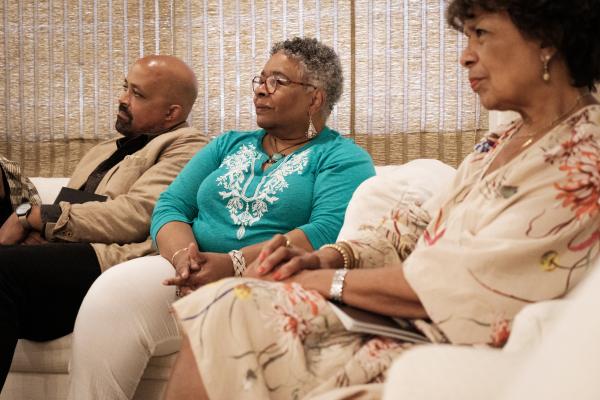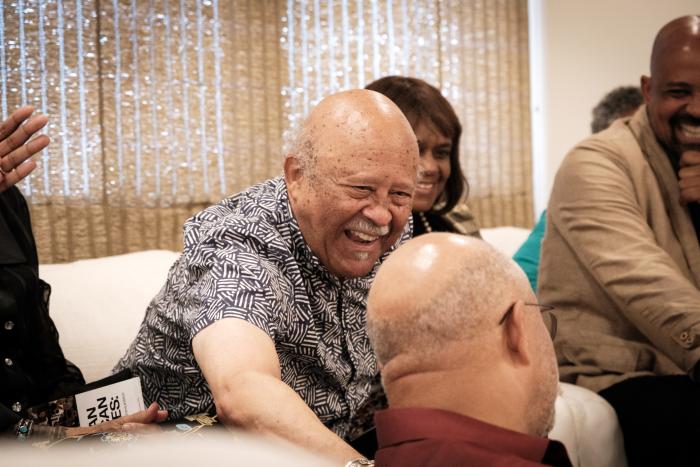Baha’i Chair Documents ‘African American Legacies’
New video series shares 24 stories of resilience in the face of racial segregation
The Baha’i Chair for World Peace at the University of Maryland has published a video series featuring 24 first-person narratives of African American life during the era of enforced American segregation—the era known as Jim Crow.
“The Baha’i Chair has five themes that it considers barriers to peace, one of which is structural racism and the root causes of prejudice. In this country, the study of that takes us back to slavery and all that has transpired since then, including Jim Crow laws,” explained Hoda Mahmoudi, the Bahá'í Chair for World Peace and director of the new African American Legacies project.
Recounting that pre-integration era, the interviewees describe a world that changed dramatically after the Jim Crow laws were overturned in the mid-1960s. They share memories about difficult experiences, such as being denied service at restaurants and stores, and also discuss navigating fame, tough decisions and paths to maturity.
One of the stories that stood out to Mahmoudi was the story of the famed African American architect, Paul Williams. His granddaughter, Karen Hudson, shares how Williams had to learn to sketch upside-down for his mostly white clients, because he was forced to sit on the other side of the table.
In conversation with Mahmoudi (either in Los Angeles or Washington, D.C.), the interviewees also mention memories of a positive, dynamic, and loving community, which, despite all the efforts to hold it back, found ways to thrive.
“Despite all the doors, in the sense, being closed to them, these people found ways to open doors, and they did it by helping each other,” Mahmoudi said. “Instead of responding to some of the disgusting things that were said or done to them, these individuals decided they didn’t want to be like that. They found a different way to deal with the odds they were up against, and that way was all about their own dignity, their own respect, and their responsibility for their community.”

Understanding the nature of the community that thrived during segregation was the initial spark of the project, brought to Mahmoudi’s attention by Baha’i Chair Faculty Fellow Malik Wilson. Wilson’s parents, Ernest and Francille Wilson, were part of the last generation to experience both segregation and integration.
“My parent’s generation is the last generation who can recall that civilization of old, [in which] their parents and forebears stitched together a vibrant and warm and purposeful and full life not only without assistance, but oftentimes with direct resistance. Though the tales are in some ways elegiac, there is indeed an essential nowness to the work, which lies in the tough reality that the generation of those African Americans who experienced this reality are rapidly passing away,” he said. “I hope viewers will be inspired by the story of a people, who, facing remarkable odds, leaned into the wind, surrounded by a warm and loving and cheering community. It’s a testament to human accomplishment, to faith and belief, and even to the promise of this country.”
The Abdolhossein and Guitty Ejtemai Foundation—whose mission is to provide assistance to organizations furthering the promotion of arts, education, and human rights—provided the Baha’i Chair with $25,000 to carry out the project.
“We at the Ejtemai Foundation are humbled to be a part of The African American Legacies
Project,” said Guitty Ejtemai, foundation co-director. “We continue to be inspired by the work of the Baha’i Chair for World Peace at the University of Maryland, particularly its efforts to determine the root causes of prejudice and undo the impacts of structural racism. By highlighting the achievements of the African American community, the Chair has offered a blueprint for how the lessons of success and sustenance can be applied to the grand effort of creating a better world for all.”
View the African American Legacies project at bahaichair.umd.edu/african-american-legacies
The main photo of Ernest Wilson smiling and laughing alongside other interviewees from the African American Legacies Project is by Sue Hudelson. The photo of Malik Wilson, Francille Wilson and Brenda Bass is also by Sue Hudelson.
Published on Tue, Feb 20, 2024 - 10:11AM




